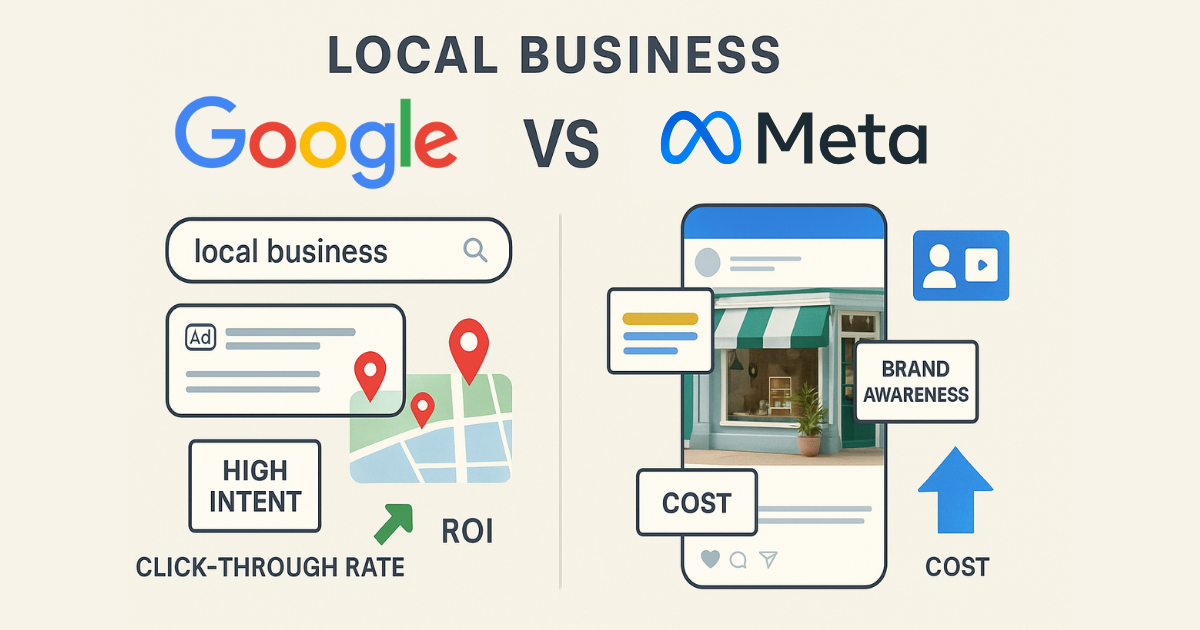
Google Ads vs. Meta Ads: Which Is Better for Local Businesses?
For a local business, marketing decisions often come down to a simple but tough question: where should the budget go? Digital ads are one of the quickest ways to bring in customers, but there are so many choices. Two platforms usually top the list—Google and Meta (Facebook and Instagram).
On the surface, they both promise to get your business in front of people. But how they do it, and the kind of results you get, can be very different. Let’s look more closely at each side and where they actually make sense for local businesses.
How People Discover You
This is where the difference between the two platforms feels the sharpest.
Google Ads tap into intent. Someone types “roof repair near me” or “best pizza in Jersey City,” and at that moment, they’re already ready to act. If your business appears in those results, the odds of turning a click into a booking are high. You’re meeting the customer at the exact time they want what you offer.
Meta Ads—Facebook and Instagram—don’t rely on people searching. Instead, they focus on discovery. People are scrolling through their feeds, not necessarily shopping, but they might see your ad for a yoga class, a boutique sale, or a new restaurant opening. The ad plants an idea: “Maybe I should check this out.”
For a local business, it helps to think of Google as the tool for “catching demand” and Meta as the tool for “creating demand.” Both are useful, but they play very different roles.
Targeting and Ad Formats
Targeting is often where small businesses get excited—or overwhelmed.
With Meta Ads, you can narrow your audience in a way that feels almost personal. Want to reach 30-year-old parents within 10 miles of your shop who like coffee and follow certain lifestyle pages? You can. Add in custom audiences from your email list or retarget people who visited your website, and you get a powerful funnel. The formats lean heavily visual: Instagram Reels, Facebook Stories, or carousel ads that show multiple products. For businesses with something photogenic—a bakery, salon, fitness studio—this can be a big win.
Google Ads take a different approach. The strength isn’t in interests or demographics as much as location and intent. You can target zip codes, neighborhoods, or even set a radius around your storefront. Combine that with keyword targeting, and suddenly your ad shows up right when someone nearby searches for “emergency plumber” or “Italian food takeout.” There’s also Google Maps placement, which is invaluable for local services.
Meta lets you speak to people based on who they are. Google lets you catch them based on what they want right now. If you step back, both are useful lenses—you just need to know which lens matches your current goal.
Cost and What You Actually Get
Costs are tricky because they vary by industry, but the patterns are consistent.
Meta Ads usually come in cheaper. Cost per click might be under a dollar, sometimes far less. But here’s the trade-off: those clicks are from people casually browsing. They might not take action right away. So while it feels nice to see cheap clicks, you may wait longer for those clicks to turn into actual customers.
Google Ads often cost more—two, three, even ten dollars per click in competitive industries. But these clicks usually come from people who are already in “buying mode.” If someone searches “same-day electrician,” they don’t need to be convinced. They just need the right business to show up, and they’re ready to book.
A local café might see better ROI on Meta because pictures of latte art and weekend specials work well in a scrolling feed. A plumbing company, on the other hand, might get better returns from Google because urgency is baked into the search.
When Each Platform Makes Sense
It helps to map the platform to your actual business type.
-
Google Ads are strongest for businesses tied to urgent or high-intent searches. Think locksmiths, dentists, restaurants, auto repair shops. If people in your area are actively typing “near me” queries, Google is where you need to be.
-
Meta Ads shine for businesses that thrive on visuals, events, or community buzz. A yoga studio promoting open classes, a boutique announcing a seasonal sale, or a restaurant sharing mouth-watering food photography—these play well on Instagram and Facebook.
The overlap is where things get interesting. A restaurant could use Meta to build anticipation for a new menu launch, then use Google Ads to capture people searching for “dinner near me” that same weekend. A gym could use Meta to keep awareness high and Google to catch people searching “join a gym near me.”
Why Many Local Businesses Use Both
A lot of small business owners eventually realize that it doesn’t need to be a choice. The platforms work best when they complement each other.
Meta builds familiarity. Even if someone doesn’t click your ad the first time, repeated exposure keeps your brand top of mind. Then, when that person finally needs your service, they might type it into Google—and there you are again, right at the top.
This cycle of awareness and intent is powerful. Meta is where people notice you. Google is where they act on that recognition. Local businesses that use both often see steadier results than those who try to rely on only one channel.
Final Thought
So which is better? The answer is: it depends on your goals, your budget, and your type of business. Google is the obvious choice when you need immediate leads. Meta is better when you want to grow visibility, build a local following, or promote something new.
For most local businesses, the smartest path is blending the two. Let Meta make you familiar and approachable. Let Google capture the people who are ready to pick up the phone or walk through your door. When you use them together, the platforms stop competing and start working like two sides of the same coin.
.webp)


